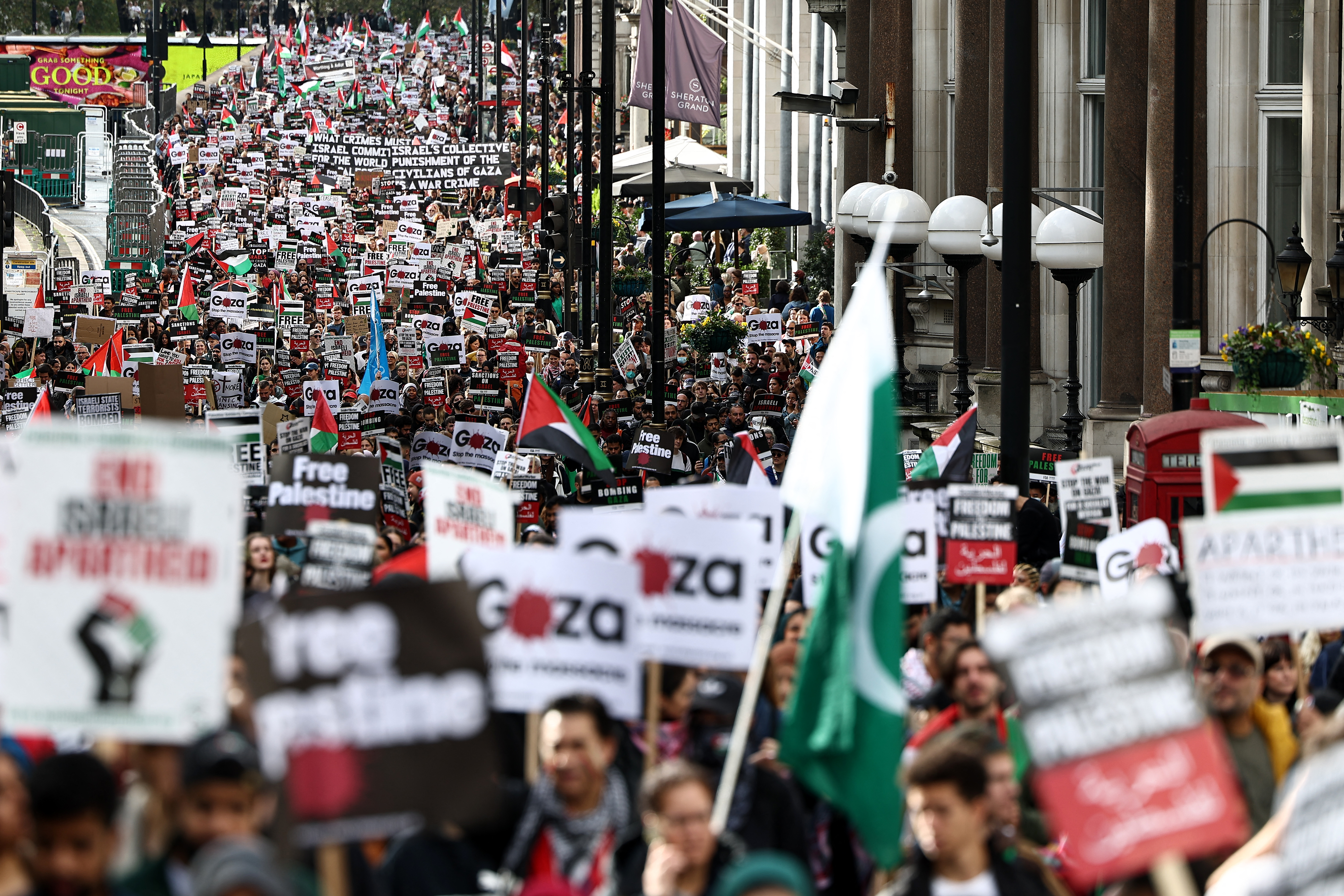With one global war still at a stalemate, a new global conflict has erupted in the Middle East.
Viewed from Europe, the Israel-Hamas war is a complete minefield. It has exposed vast divisions: among European countries, between political leaders and their publics, and, most of all, between the West and the Global South, to whom the West was looking for support over the Ukraine war.
A long war in Gaza threatens to harden these divisions, perhaps even to the point where Western support for Ukraine is affected.
Those divisions were on display this week, when foreign ministers from the European Union met to try to forge an agreement on the Gaza war. The EU has been internally convulsed since the conflict started.
Almost immediately, the head of the EU Commission Ursula von der Leyen traveled to Israel, without consulting the European Council, which represents all the national governments. A different duo from Europe then went to Egypt to represent the EU there, before von der Leyen and the president of the European Council Charles Michel appeared together in Washington. Across three continents in a matter of days, there was no consensus over who was representing the European Union, let alone what they were saying.
On Thursday, the bloc’s leaders called for “humanitarian corridors and pauses” to allow aid to reach Gaza, but only after days of bickering over the form of words. They stopped short of calling it a “humanitarian ceasefire” that had been mooted.
Those divisions extend to their publics. There appears to be a gulf between those in power and those who vote for them. Europe has seen mass public demonstrations against the Gaza war, the largest outpouring of anti-government protests since the Iraq War.
In London, Paris, Berlin, Madrid, Athens and many other cities, tens of thousands have taken to the streets on multiple occasions, criticizing their governments support for the war.
Particularly in France and Germany, authorities have appeared surprised by the scale of the protests and unsure how to respond. The French interior minister took a surprising decision to ban pro-Palestinian protests across the whole country, only to be overturned by the highest administrative court. This week, protests took place in cities across France. Germany has also tried to use legal means to stifle demonstrations, denying requests for protests.
Such protests have had a political impact, with leaders ameliorating the language they use over the conflict, especially towards the Palestinians. But as the war drags on – the expected main ground invasion hasn’t even begun – that balancing act will become harder to maintain.
An even bigger division looms with the Global South.
Since the start of Russia’s invasion of Ukraine last year, the West has tried to rally support among non-Western countries by framing the invasion as more than a European war. The Ukraine conflict, they argued, was about international law, and thus countries far from the conflict – in Beijing, in Abuja, in Cairo – ought to side with Ukraine because it was about upholding the rule of law.
Then came Israel’s response to the Hamas attack. Within days, the United Nations human rights office was warning that the siege of Gaza and the demand that one million Gazans in the north flee their homes could breach international law. More such warnings followed.
That disconnect between why the Global South was being asked to weather extreme pain over the Ukraine conflict and the extent of public support that European and American leaders were willing to offer Israel, regardless of its military policy, was noted.
Last week, Russia brought a resolution before the UN Security Council that called for a pause in the fighting, as well as condemning the Hamas attack. Despite major Global South countries – China, Brazil – backing the resolution, and even France, the United States vetoed it.
The danger for Western countries is that this way of acting falls completely in line with what Russia and China have been arguing: that the global order only favors a handful of countries, and the Global South is not in that club. King Abdullah of Jordan put it most starkly: “International law loses all value if it is implemented selectively.”
Indeed, the aspiring leader of the Global South, China, was gifted an opportunity to demonstrate this last week, when a summit marking ten years of the Belt and Road Initiative was held in Beijing. Against the background of America’s frantic diplomacy in the Middle East, Xi Jinping presided over a conference with 130 countries represented, including some of the biggest Global South countries, Indonesia, Ethiopia – and, at the center of it, Russia.
That moral aspect isn’t the only issue. There’s also self-interest. Another winter is coming across Europe, and already there are signs that Europe’s attempts to restrict Russian gas sales are eroding. A week after Hungary’s prime minister met Vladimir Putin in Beijing, it was announced the country would buy more gas over the winter. If the West can’t even hold together countries within the EU, how likely are they to keep a broader coalition, as the Ukraine war plods towards a second winter and eventually a third year?
Taken together, the differences between leaders and publics, within Western blocs and across the Global South, pose an enormous challenge for the West, as it seeks to keep both wars in the public eye. As the Gaza war escalates, and the front lines in Ukraine freeze, that will be harder, and the shaky coalition of the past 19 months may quietly crumble.
Faisal Al Yafai is currently writing a book on the Middle East and is a frequent commentator on international TV news networks. He has worked for news outlets such as The Guardian and the BBC, and reported on the Middle East, Eastern Europe, Asia and Africa. X: @FaisalAlYafai

